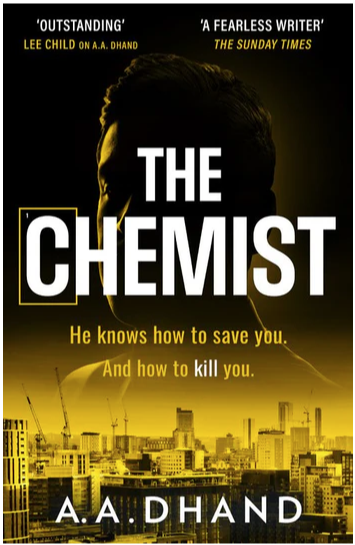‘Dexter meets Breaking Bad’ in pharmacist’s crime novel ‘The Chemist'

Do you think being a community pharmacist is sexy?
A pharmacist’s encyclopaedic knowledge of drugs and ability to cure people with them is surely the envy of any healthcare professional. And helping people achieve good health is an undeniably attractive quality.
But community pharmacist and crime fiction writer A. A. Dhand is trying to build on this sex appeal in his new book ‘The Chemist’.
Read more: Pharmacist’s ‘Virdee’ book will have its TV adaption broadcast on BBC One in 2025
“I wanted to showcase community pharmacy in a slightly sexier manner,” he tells C+D. “We’re seen in a silent, non-specific way in the background.
“So, I thought, ‘how can I take this career I love and make it sexy and a high-end drama and make an interesting character that will break the glass ceiling and be genre-defining’.”
The result is a new book that follows Idris Khan running a methadone service in Leeds from his pharmacy. But Idris goes looking for his childhood sweetheart Rebecca when she misses her methadone dose, pushing him into a turf war between drug cartels.
Read more: A.A. Dhand: Pharmacist crime author to publish new novel The Chemist
“If a drug dealer walked in and blackmailed me to supply heroin through my pharmacy rather than methadone to the addicts, how would I get out of that?
“Walking around the pharmacy, I can weaponize my knowledge to take the fight back to the drug dealers. That’s how ‘The Chemist’ was born.”
Hanging out with addicts
It’s Dhand’s seventh published novel to date, with the first five adapted and broadcast on BBC One.
His own experiences of running a 100-hour pharmacy in Headingley next to Leeds city centre helped shape the novel.
“It was always something I wanted to do. It’s a personal novel because I’ve worked as a community pharmacist for over 20 years.”
Read more: ‘Virdee’: Pharmacist crime novelist’s bestsellers to be made into BBC series
Being based in Headingley, Dhand served a lot of students who lived nearby and ‘The Chemist’ quickly alludes to what this patient demographic frequented their chemist for the most: a hangover cure (a combo of omeprazole, oral rehydration tablets and paracetamol).
Dhand also helped a lot of “blue scripts” who came in for methadone.
“There are so many amazing stories I would hear because I spent a lot of time with them. Being a writer you want to hang out with interesting people. I ended up having a really good relationship with a lot of the addicts and seeing what it looks like – the vulnerabilities and manipulations of drug addiction, illegal immigration and criminality.”
Read more: ‘Everyone’s got a story’: meet the pharmacist who became a filmmaker
It was Dhand’s “rare” meetings with high-functioning addicts that led him to create the storyline between Idris and Rebecca.
“I thought, ‘what if a pharmacist was in a relationship with somebody who is on methadone, what would that look like? And if she became vulnerable, what would you do to save her?’”
.jpg)
Frank conversations
Growing up in nearby Bradford on an estate where there were a lot of drugs around, it meant there was no stigma or prejudice for Dhand to work with addicts in his pharmacy. But he tells C+D how he still had to be firm with them on occasion.
“With the methadone, I’d always have a frank conversation with them when they came in. I’d say ‘I’ll treat you like anybody else but if you f*** about, you’re out. You wait the same as anybody else waiting for a prescription.’
“They probably never heard a pharmacist speak like that. But I’d also help them go for a job, help with their CV, or give them a coffee. And just give them time, that’s what nobody ever gives them because they’re seen as drug-fuelled criminals.
Read more: Killer Clown: Book reveals murder witness pharmacy worker’s story
“I never saw them that way. They love their partners, their children, but unfortunately, they are addicted to drugs so that compromises some of their ability to make reasonable decisions.”
This approach from Dhand is mirrored in Idris’ interactions with the addicts he meets at his pharmacy, something that brings Idris respect from the other characters.
But building these relationships with addicts also led Dhand to see some unbelievable incidents, notably witnessing a drug dealer outside his pharmacy run over and kill one of his addicts he helped.
In 2020 Dhand started patching together these memories for ‘The Chemist’ when he felt there was an “opportunity to try something new” after finishing his Harry Virdee novels.
“I always had this idea to write ‘Dexter meets Breaking Bad’ because the community pharmacist has access to all the drugs. But legal drugs can be just as serious – the only difference between a medication and a poison is the dose.”
Prescriptions are stories
Dhand’s creative spark was often lit late at night after finishing his shifts at his pharmacy.
“In the early days, I would do the 3pm – 11pm shift and when I came home, I would write until 2 or 3am. If I did the day shift and finish at 3pm, I’d come home and be a husband and father then write 8pm until midnight.
“Being a writer, you use very different parts of the brain. At a pharmacy, it’s binary and very procedural. There’s no creativity, it’s very strict and regulated.
Read more: The Pharmacy: Channel 4 commissions pharmacist-penned comedy short
“But when I came to writing, that part of my brain had been asleep all day, and now I need to wake that side of my brain up and be creative. So, it worked beautifully for me.”
But he admits there is some overlap between the two professions.
“I see every prescription as a story. Let’s say it’s for aspirin, I know 75mg is a blood thinner for someone at risk of heart attack, or 300mg if they are in pain. I immediately know intimate details about that person before I even say hello to them.”
Read more: Mystery pharmacist publishes a widely praised romantic novel
The themes of identity, race and family are threaded through Dhand’s writing across his novels, but he has found these can often be misunderstood because of the ethnicity of his characters.
“Harry and Salma are in an interfaith marriage in Virdee and that causes heartache, but it’s a universal theme. Parents want to know who you’re marrying and have an opinion on it. I use universal themes but because my characters are brown, it becomes very narrow.
“Everyone says that ‘it’s about arranged marriage’. No, it’s about love. So, I like to stay away from those derivative descriptions of what I do in terms of community or culture, because every single story is about community and culture.”

“I had 66 rejections”
Dhand’s parents moved to Bradford and ran a corner shop where he first encountered working behind a counter, before moving into pharmacy.
A huge source of pride for Dhand is that his Virdee TV adaptation went live just as Bradford celebrates its 2025 UK City of Culture for 2025.
“It’s kind of my gift for the city, for Bradford to be cinematic, sexy and really beautiful. It just tied in nicely and happened at the right time and right place.”
Read more: The Poetry Pharmacy secures Pan Macmillan anthology series
He grew up reading books by Stephen King, Thomas Harris and Tess Gerritsen but it never felt like a realistic career to move into.
“I was brought up where you need to get a job, and in a South Asian background with my parents as corner shopkeepers, [it was about] getting a job that pays the bills. It was just a passion I enjoyed.
“But there were no South Asian crime writers. I was the first South Asian crime writer to do commercial fiction. Even now, it is limited to 10 South Asian crime writers who are doing okay, so there’s still a long way to go in terms of representation and seeing this as a viable career path.
Read more: 'I've always loved to read': The pharmacist with a passion for writing romantic fiction
“It took me 10 years to get Harry Virdee published. I had 66 rejections from literary agents, so it was pretty brutal.
“Whereas now my path is slightly easier. ‘The Chemist’ was easier to get published and I’ve sold the TV rights because I have a track record.”
New contract a “s***show”
Dhand’s rejections in the publishing world had helped him to “fail forwards”, but he feels far more pessimistic about the future of community pharmacy and the government “failing forwards” to help the sector.
“It’s a right s***show. I’ve tried to engage with politicians. It’s all about how much we can cut and screw pharmacists when they have no idea what we do. I’m really aggrieved. The new contract is a pile of s***.”
The dire reality for community pharmacists is referenced in ‘The Chemist’.
Read more: Podcast – Pharmacists after Hours Ep.3: The crime fiction author
There are mentions of “draconian cuts”, plus “urgent” letters sent from wholesalers asking for payments. Idris pleads for a good flu and Covid vaccination season to help him settle his debts.
In real life, Dhand sold his Headingley pharmacy two years ago despite doing nearly 20,000 prescriptions per month.
“I couldn’t make it pay,” says Dhand. “The financial modelling of pharmacy is at an all-time low. They can say pharmacy shouldn’t make a profit because nobody should make profit from the NHS. But it’s the same business model as GPs. It’s no difference.”
Read more: Pharmacy to Pokemon: ‘You don’t know what’s going to happen next!’
He believes the way to “revolutionise” pharmacy is by doing things to take the pressure off GPs.
“The business model is mega stress. I would deregulate 60-70% of POMs and make them P-meds.
“But the minimum wage has gone up again and the latest national insurance contribution increase has just taken the funding. We’re still £1bn short and they expect us to be appreciative. It’s scandalous.”
Love
A sequel to ‘The Chemist’ is underway along with a TV adaptation of the series to come. But Dhand has more plans beyond his pharmacy-inspired novels.
“I’d love to go back to India. I’ve got an idea for a story I’d love to develop which is based in India. That’s on my radar when I get time.”
Read more: ‘Pharmacists are like N’Golo Kanté’: Meet the pharmacist scouting football’s next big star
And in the meantime, he still loves “being a pharmacist. I’ve not worked as one for a third year now and I miss it a lot.
“I had no plans to sell the pharmacy, I loved it. It pained me I had to do it. Being behind a counter serving customers... I hope to go back to it one day.”







Please sign in or register for FREE
If you are a registered user on C+D Community, please sign in